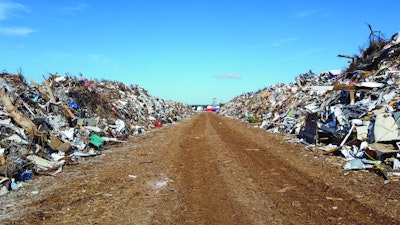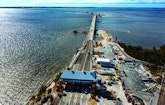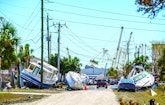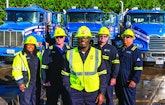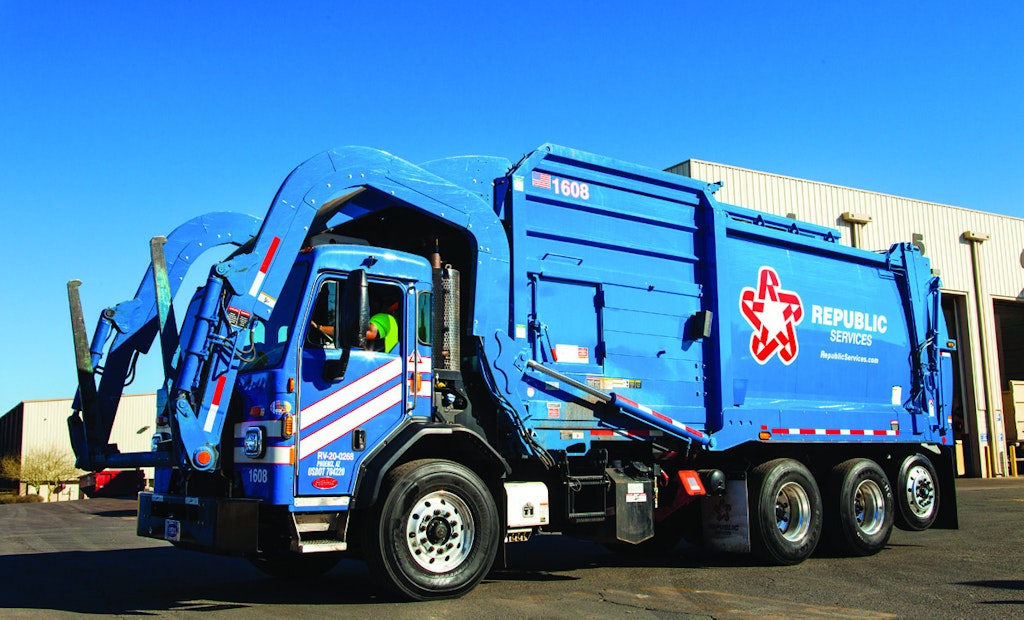Interested in Debris?
Get Debris articles, news and videos right in your inbox! Sign up now.
Debris + Get AlertsWhen the eye of Hurricane Ian passed Florida’s Gulf Coast, in September 2022, Republic Services didn’t blink. Within four hours, its assembled personnel assessed damage, prioritized missions and began to strategically deploy the company’s rubber-tired and marine fleet of equipment.
Robert Breed, Republic Services general manager of emergency response programs and special operations and 25-year company veteran, has helped steer the company through the aftermath of numerous hurricanes and other natural disasters.
Traditionally, Republic Services’ post-storm services have been collection and disposal of general waste left behind by a storm. But with Hurricane Ian, things were different. For the first time, Republic Services was able to offer a larger array of services to customers. A few months before, the company had acquired US Ecology, a provider of environmental, emergency and disaster response services.
“Acquiring US Ecology gave us a broader approach to chemical and environmental impacts of a storm, going beyond the classic municipal waste cleanup,” says Breed. “This time, we really were responding in a different capacity.”
GETTING SET
Emergency response companies don’t just show up after a disaster. When Hurricane Ian began to form, Republic Services and its customers in the path of the emerging storm already were on the phone. Roughly two weeks before landfall, the conversations were along the lines of, “What will you need from us when the storm hits?”
“We work proactively with customers, learn of their expected needs and plan how to respond,” says Breed. “At the top level, we begin assigning leadership responsibilities and identifying sites to pre-stage our equipment.” For Hurricane Ian, Republic Services deployed equipment to Florida from 11 states.
The company actually evaluates an entire community’s needs, not just focusing on contracted customers. Since hurricane rains fall on customer and noncustomer properties alike, they try to anticipate appeals for help from municipal or commercial executives who are not yet customers.
In the hours after a storm hits, Republic Services managers interact with other response outfits on site to form an incident command to coordinate simultaneous assistance for numerous customers. “The command center helps prioritize where assets should go, what regions are safe to repopulate, and so on,” says Breed.
Among the equipment marshaled along the Gulf Coast following Ian, were 130-barrel vacuum trucks and trailers, trash collection trucks, portable storage tanks, command trailers, specialized firefighting equipment, small trailers and boats. The company’s comprehensive boat fleet ranges from small flat-bottomed jon boats to 150-foot ocean-going vessels. “We have more than 300 marine vessels and most are custom built.”
TASKS ON SITE
It turned out that a third of Republic Services’ tasks along the coast were offshore. “There was a lot of need for our shoreline operations equipment and services. Several commercial fleet craft had sunk and quite a bit of diesel fuel containment was needed,” Breed says.
Because the storm collapsed the causeway leading to Sanibel Island, reaching island customers became a problem. To ferry the company’s one-ton, four-wheel-drive trucks to Sanibel, the company called on marine equipment normally utilized in offshore oilfield emergency responses. “There were some unique equipment needs after Ian,” Breed says. “In this case, we worked hard to load our trucks on barges and land them on the beach of Sanibel Island.”
So, boats proved to be the biggest equipment asset, he says, with small trucks and trailers being the second most valuable. The company’s clients include national pharmacies and other retailers and, Breed says, “the smaller pieces of equipment helped us get to a lot of smaller retail locations that had been impacted.”
He says handling hazardous material was a very small part of the work because no major oil refinery or chemical production facilities are located in the area. But retail outlets were missing roofs, post offices contained soggy mail and store product displays were underwater.
“One of the places we worked in was pharmacies. When a pharmacy is flooded six or eight feet deep, the store’s food, candy, medicine and other shelved products must be thrown away and over-the-counter and prescription medicines must be properly and safely disposed of.”
END GOALS
Breed summarizes the company’s hurricane recovery work this way: “The top task always is to support a return to normalcy for a community.” That support sometimes continues for two or three years.
The company has more than 70 wholly owned emergency response locations across the country and hundreds more through a pre-vetted independent contractor network. Company-wide, 40,000 people work for Republic Services, about 2,000 of them with emergency response credentials. At the height of the Ian response, some 200 company employees labored along the Gulf Coast, along with independent contractors.
A constant priority is keeping employees safe when they work from dawn to dusk in extreme conditions. Breed calls the company’s safety program “very robust.” The always-looming danger is complacency. As team members begin to acclimate themselves to nails protruding from dismantled structures, downed power lines and buildings weakened by flooding, the risk increases.
“Every daily and shift-change briefing covers all the associated risks out there. With every assignment, a task and site-specific program is developed and signed off on by employees,” says the general manager. “The point is, this is not just work as usual.”
When the recovery mission is complete, a critical incident debriefing is undertaken by company executives. “Our team had extensive discussions after Hurricane Ian,” says Breed, “to summarize our success and identify new ways to deliver solutions for customers facing hurricanes in the future.”
Natural disasters have devastating effects on communities and the arrival of environmental cleanup companies can add to the disruption. Republic Services is mindful of its impact on routine and tries to mitigate any ensuing problems.
“We always take a community-first approach, ensuring that we are responsible neighbors and dependable partners,” Breed says. “Our equipment is deployed quickly and safely.”
Ocean-spawned storms are just one cleanup scenario for Republic Services. The company also routinely cleans chemical and oil refinery spills and large wildfires. “Our diversity is a benefit to our customers and our communities.”
